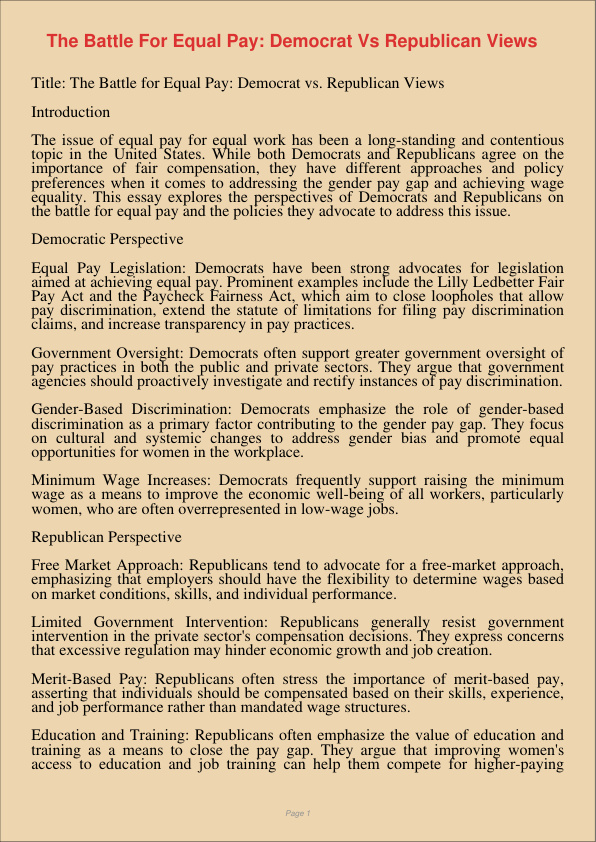The Battle For Equal Pay Democrat Vs Republican Views
Jan 12, 2024
democrat vs republican views
equal pay
Psychology
Macro & Microeconomics

Title: The Battle for Equal Pay: Democrat vs. Republican Views
Introduction
The issue of equal pay for equal work has been a long-standing and contentious topic in the United States. While both Democrats and Republicans agree on the importance of fair compensation, they have different approaches and policy preferences when it comes to addressing the gender pay gap and achieving wage equality. This essay explores the perspectives of Democrats and Republicans on the battle for equal pay and the policies they advocate to address this issue.
Democratic Perspective
Equal Pay Legislation: Democrats have been strong advocates for legislation aimed at achieving equal pay. Prominent examples include the Lilly Ledbetter Fair Pay Act and the Paycheck Fairness Act, which aim to close loopholes that allow pay discrimination, extend the statute of limitations for filing pay discrimination claims, and increase transparency in pay practices.
Government Oversight: Democrats often support greater government oversight of pay practices in both the public and private sectors. They argue that government agencies should proactively investigate and rectify instances of pay discrimination.
Gender-Based Discrimination: Democrats emphasize the role of gender-based discrimination as a primary factor contributing to the gender pay gap. They focus on cultural and systemic changes to address gender bias and promote equal opportunities for women in the workplace.
Minimum Wage Increases: Democrats frequently support raising the minimum wage as a means to improve the economic well-being of all workers, particularly women, who are often overrepresented in low-wage jobs.
Republican Perspective
Free Market Approach: Republicans tend to advocate for a free-market approach, emphasizing that employers should have the flexibility to determine wages based on market conditions, skills, and individual performance.
Limited Government Intervention: Republicans generally resist government intervention in the private sector’s compensation decisions. They express concerns that excessive regulation may hinder economic growth and job creation.
Merit-Based Pay: Republicans often stress the importance of merit-based pay, asserting that individuals should be compensated based on their skills, experience, and job performance rather than mandated wage structures.
Education and Training: Republicans often emphasize the value of education and training as a means to close the pay gap. They argue that improving women’s access to education and job training can help them compete for higher-paying positions.
Common Ground
Transparency: Both Democrats and Republicans support pay transparency as a means to address wage disparities. They believe that greater transparency in pay practices can help identify and rectify instances of discrimination.
Workplace Flexibility: Both parties acknowledge the importance of workplace flexibility, such as flexible hours and telecommuting options, to help individuals balance work and family responsibilities.
Conclusion
The battle for equal pay continues to be a prominent issue in American politics. Democrats and Republicans differ in their approaches to achieving wage equality, with Democrats favoring legislative measures and government oversight, and Republicans advocating for a more market-driven, merit-based approach. Despite these differences, both parties recognize the need for transparency and workplace flexibility to address the gender pay gap. The ongoing debate over equal pay reflects the broader struggle to balance individual economic freedom with the goal of achieving wage equality and eliminating gender-based discrimination in the workforce.